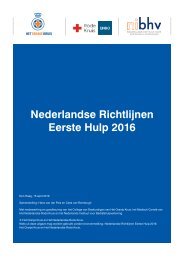Thesis-Anne-Vos-Masters-SBR-and-EU-Law-3
Thesis-Anne-Vos-Masters-SBR-and-EU-Law-3
Thesis-Anne-Vos-Masters-SBR-and-EU-Law-3
Create successful ePaper yourself
Turn your PDF publications into a flip-book with our unique Google optimized e-Paper software.
to spread in the European Union. It has been raised that shale gas extraction could be a ‘gamechanger’<br />
(in order to address the increasing dem<strong>and</strong> <strong>and</strong> dependency on some countries), 8 but is<br />
that really the case?<br />
The development of shale gas comes along with a lot of insecurities <strong>and</strong> it has received much<br />
scepticism of the public. Many MS have tried to regulate some of these insecurities <strong>and</strong><br />
acceptance problems. In the Netherl<strong>and</strong>s, the Minister of Economic Affairs has adopted a<br />
moratorium on shale gas extraction <strong>and</strong> is currently occupied with the adoption of a Structure<br />
Vision on Shale Gas in which he will set out inter alia how to regulate adverse effects <strong>and</strong> the<br />
appointment of possible locations for shale gas extraction in the Netherl<strong>and</strong>s. The European Union<br />
has also started to explore the possibilities of regulation. After setting out a public consultation,<br />
which made it clear that regulation was desirable, the European Commission has adopted a<br />
Recommendation hereon in the beginning of 2014. This shows that the development of shale gas<br />
extraction has had a turbulent year in the <strong>EU</strong> <strong>and</strong> its MS. While one year ago there was no<br />
(specific) regulation on shale gas extraction in the <strong>EU</strong> or the Netherl<strong>and</strong>s, now there is many<br />
political discussion <strong>and</strong> already some (non-binding) regulation. It could however be wondered<br />
whether these recently adopted or upcoming regulation is in compliance with the issues raised by<br />
the public <strong>and</strong> the politicians, especially in respect of the public acceptance <strong>and</strong> environmental<br />
concerns. Here lies the importance of this thesis.<br />
1.2 Research question<br />
Political discussion thus focuses mainly on the environmental aspects of shale gas extraction <strong>and</strong><br />
on the issue of public (non-)acceptance. It is interesting to research whether those raised<br />
questions by politicians <strong>and</strong> citizens have some ground from a legal perspective. It is difficult to<br />
assess whether the newly adopted Recommendation <strong>and</strong> the upcoming Structure Vision on Shale<br />
Gas are in contrast with concrete legal rules, since those rules are not specified (yet) on shale gas<br />
extraction. Therefore, this research will review the current <strong>and</strong> upcoming regulation on shale gas<br />
with certain general principles of Union <strong>and</strong> Dutch law <strong>and</strong> certain environmental principles of<br />
Union <strong>and</strong> Dutch law, which are generally applicable on all regulation. The research question will<br />
be the following:<br />
Is the current <strong>and</strong> upcoming regulation on shale gas extraction in the <strong>EU</strong> <strong>and</strong> in the<br />
Netherl<strong>and</strong>s in compliance with the general principles <strong>and</strong> the environmental principles of<br />
Union <strong>and</strong> Dutch law? If not, how should those principles be taken into account when<br />
developing new or adjusting current regulation thereon?<br />
To answer this question, it is first important to look at the context of shale gas extraction: what is<br />
shale gas actually <strong>and</strong> what are the techniques used for extraction? Here, the political discussion<br />
<strong>and</strong> public debate is also set out: why is the public opposed to shale gas <strong>and</strong> what are the reasons<br />
for extracting it? These questions constitute Chapter 2.<br />
Then, it is essential to assess how the current regulation on shale gas extraction is constructed.<br />
This will provide the framework that can be reviewed against the principles. First, the European<br />
regulation will be set out (Chapter 3). It is necessary to discuss the European regulation prior to the<br />
Dutch legislation, since the first has influence on the latter. The focus will lie on the <strong>EU</strong> regulations<br />
<strong>and</strong> directives concerning the environment. Due to the extent of this research, there will be a<br />
selection of the legislation that is considered the most important. Hereafter, the Dutch regulation<br />
will be outlined in Chapter 4. The emphasis will again be on environmental aspects, but in addition<br />
the regulation on spatial planning will also be discussed. At the end of Chapters 3 <strong>and</strong> 4 several<br />
8<br />
See e.g. https://cleanenergysolutions.org/blogs/11/shale-gas-game-changer-europe<br />
8



